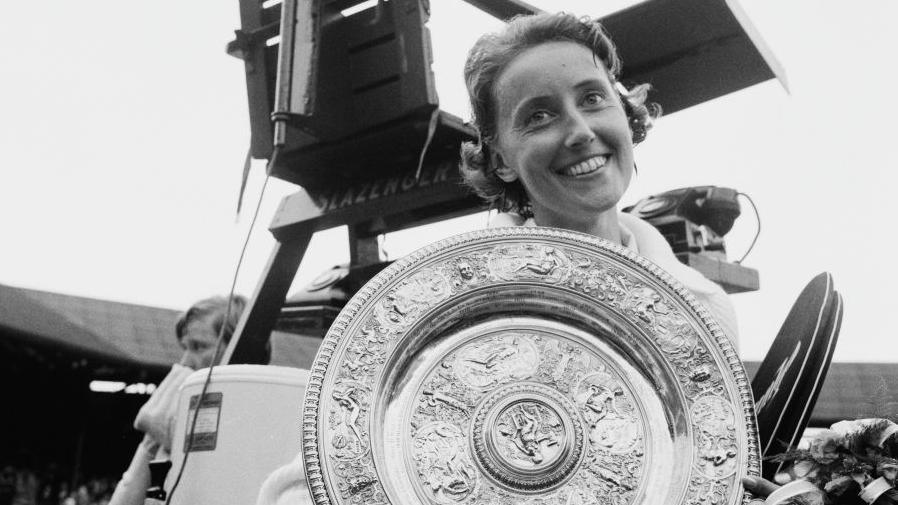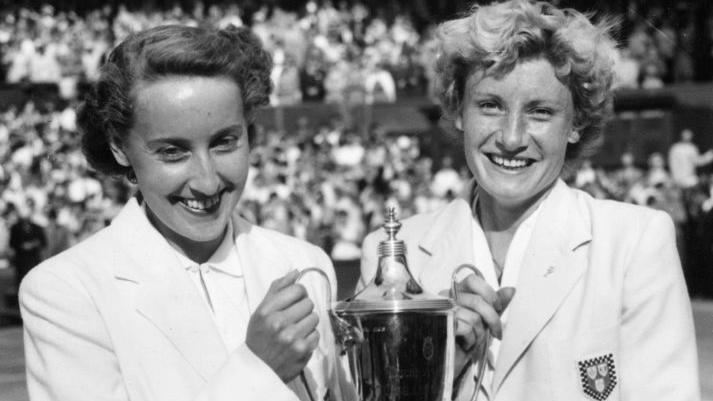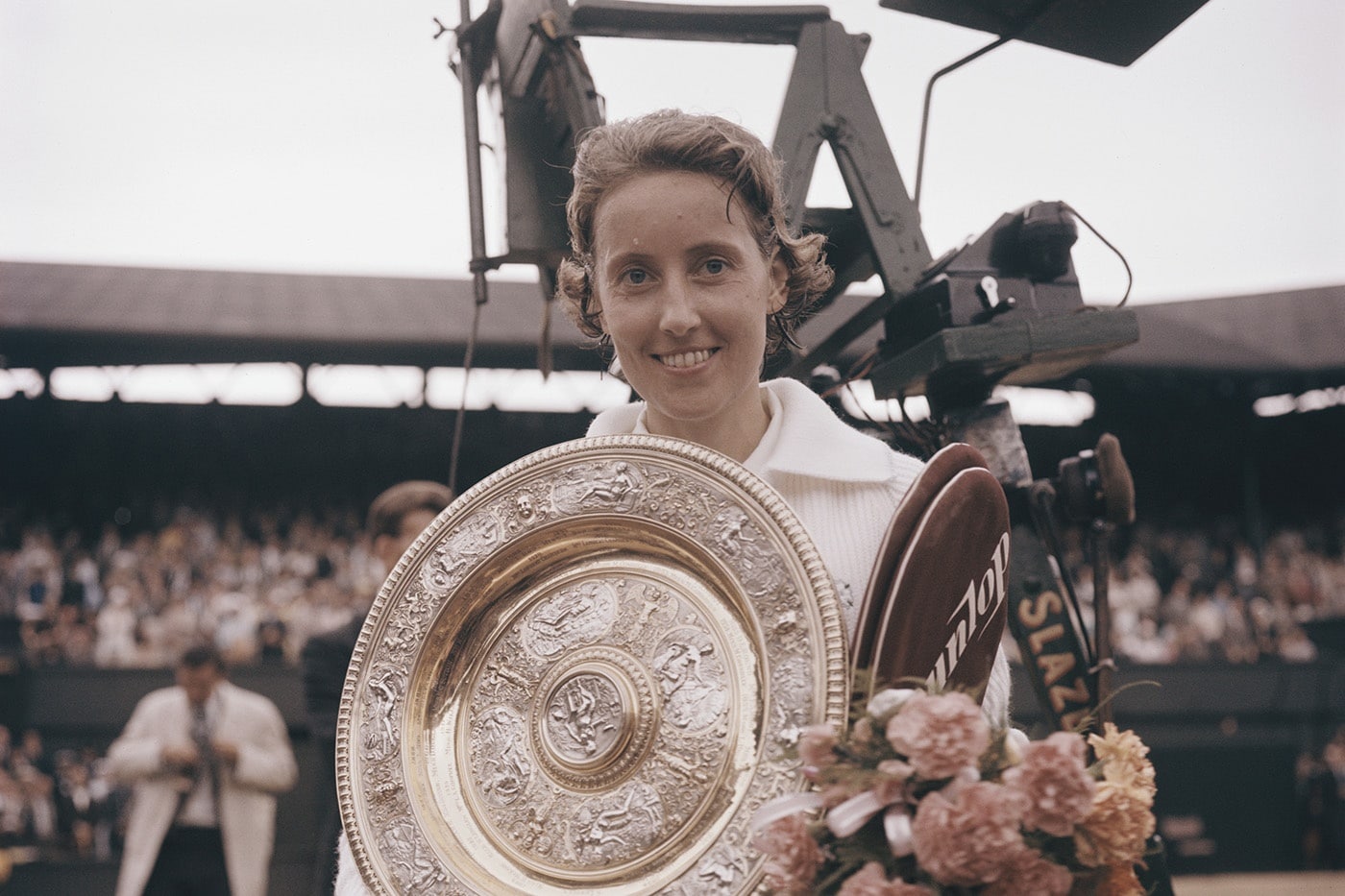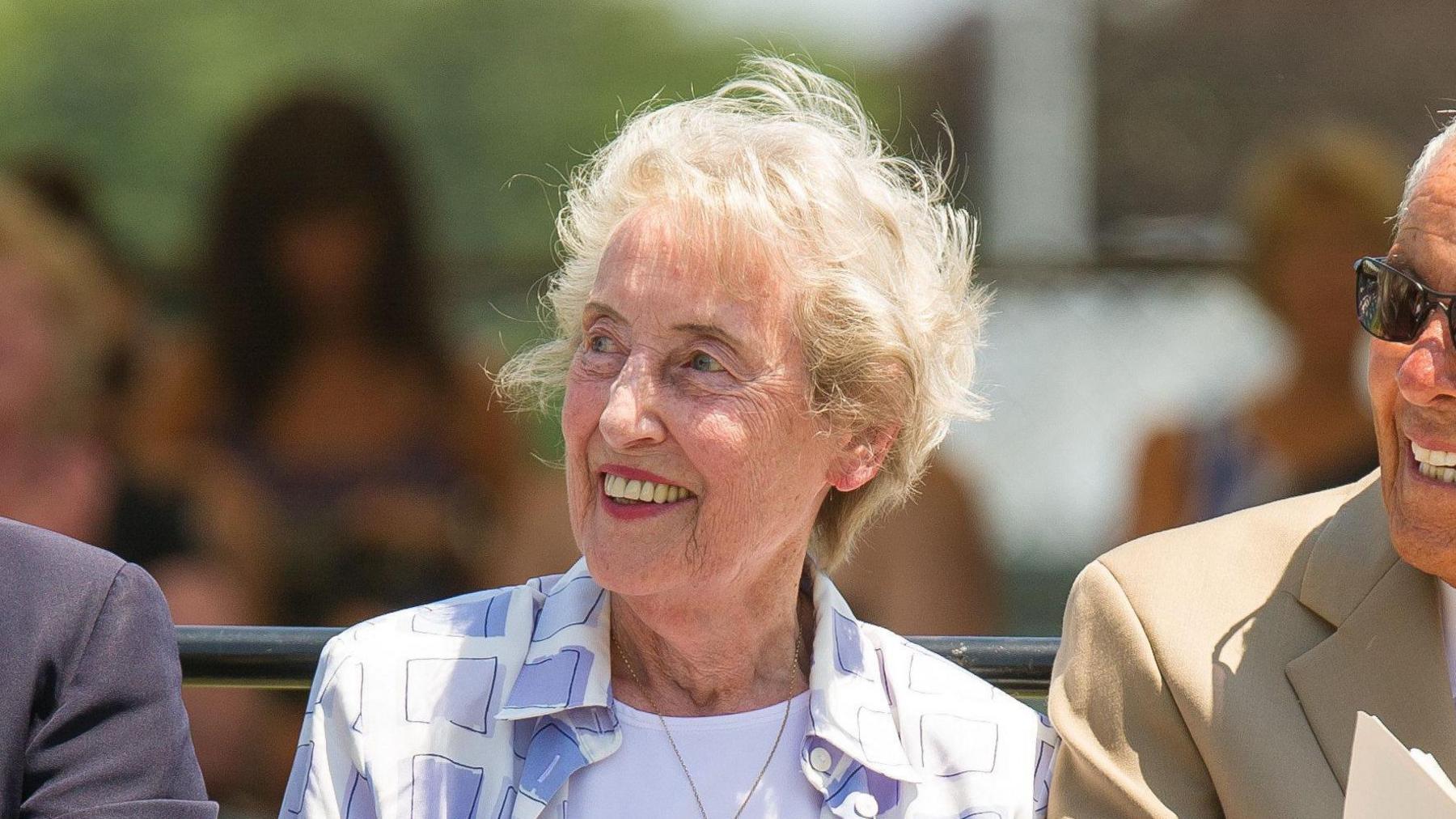
London has mourned the passing of Angela Mortimer, a celebrated British tennis champion whose career was defined by both formidable talent and an unwavering resolve to overcome significant adversity. Mortimer, who secured three Grand Slam singles titles and ascended to the International Tennis Hall of Fame, died on Monday, August 27, 2025, at the age of 93, in a London hospital. Her death, attributed to cancer, was confirmed by Robert McNicol, the esteemed historian of the All England Club, the venerable home of the Wimbledon Championships.
Mortimer’s journey through the ranks of amateur tennis was not merely a testament to her skill on the court but also to her profound resilience in the face of physical and sensory challenges. Her story is one of quiet determination, marked by triumphs that defied expectations and personal struggles that, unbeknownst to many at the time, forged an even stronger competitor. Her legacy is not just etched in championship trophies but also in the inspiration she provided through her sheer tenacity.
This article delves into the early chapters of Mortimer’s illustrious career, exploring the pivotal moments and personal battles that shaped her into one of tennis’s most respected figures. From her career-defining victory at Wimbledon to her ingenious adaptation to partial deafness, and the sheer grit required to overcome debilitating illness, we revisit the early making of a true sporting icon.

1. **A Champion’s Final Bow**Angela Mortimer, the tennis luminary who captivated audiences with her astute court craft and unyielding spirit, passed away at 93 years old. Her death on Monday, August 27, 2025, in London, marked the end of an era for British tennis. The news, confirmed by Robert McNicol of the All England Club, brought tributes from across the tennis world, remembering a player who achieved greatness despite numerous obstacles.
Mortimer’s passing from cancer in a hospital closed a chapter on a life richly lived, a life that saw her navigate the fiercely competitive landscape of amateur tennis in the 1950s and early 1960s. Her dedication to the sport extended well beyond her playing days, earning her an enduring place in its history. She leaves behind a legacy of integrity, sportsmanship, and unparalleled achievement.
She was more than just a tennis player; she was an emblem of perseverance, a figure whose quiet strength resonated with many. Her story serves as a powerful reminder of what can be achieved through sheer will and focus. The tennis community, and indeed the sporting world, mourns the loss of a remarkable woman who truly embodied the spirit of a champion.

2. **The Pinnacle of Wimbledon Glory**The 1961 Wimbledon women’s singles final stood as the crowning achievement of Angela Mortimer’s career, a testament to her steadfast determination to conquer the most prestigious grass court title. At 29 years old, and nearing the conclusion of her amateur playing days, Mortimer faced off against fellow British player Christine Truman. The match, a tense and strategic encounter, ultimately swung in Mortimer’s favor under challenging circumstances.
Truman initially gained the upper hand, securing the first set and establishing a lead in the second. However, a pivotal moment arrived when Truman was hampered by a fall and subsequently experienced a leg cramp. Capitalizing on her opponent’s misfortune with unwavering concentration and tactical brilliance, Mortimer seized control of the match, winning both the second and third sets to claim the coveted championship.
Lance Tingay, writing for The Daily Telegraph after her victory, lauded Mortimer’s play, describing her merits as “astute court craft and ability to penetrate searchingly against opposition weakness, superb driving control and command of length.” Her triumph at Wimbledon was not merely a victory in a single match but the culmination of years of relentless effort, proving her mettle on the grandest stage of tennis. It fulfilled a deep-seated ambition, as she had told The Telegraph in 2011 that if she had lost again, she “would have gone on trying and trying until I was about 86 because I was so bloody-minded.”

3. **Defying Silence: The Advantage of Partial Deafness**One of the most remarkable aspects of Angela Mortimer’s career was her partial deafness, a condition she largely kept private during her playing years. This sensory challenge, which might have debilitated others, paradoxically became a competitive edge, enhancing her legendary concentration on the court. Few people were aware of her hearing loss at the time, which impeded her ability to hear reporters’ questions in the often-noisy news scrums.
Mortimer herself reflected on this unique aspect of her game, sharing her insights with tennis historian and journalist Bud Collins for an article in The Boston Globe in 1993, the year of her induction into the International Tennis Hall of Fame. She famously stated, “I never heard the ball hit my opponent’s racket, and it amuses me when players say they need that sound.” Her inability to hear certain sounds allowed her to block out external noise effectively, a phenomenon she embraced.
She further elaborated on this unexpected benefit, adding, “I didn’t hear the crowd. But I think that was good for my concentration.” This remarkable adaptation underscored her mental fortitude, enabling her to remain singularly focused on the game unfolding before her. This trait was even beneficial in doubles play, particularly with her partner Anne Shilcock, who had a habit of continually commenting and issuing instructions; Mortimer, however, was “untroubled by this as she could not hear anything Shilcock said,” as noted by Robert McNicol in the All England Club’s tribute.

4. **A Late Start, An Unyielding Spirit**Florence Angela Margaret Mortimer’s journey into the world of professional tennis was anything but conventional, marked by a relatively late start and an early encounter that highlighted her unyielding spirit. Born on April 21, 1932, in Plymouth, England, to Florence (Beard) Mortimer and John Mortimer, a property developer, she began playing tennis in her early teens, later seeking formal coaching from Arthur Roberts, the tennis pro at the Palace Hotel in Torquay.
Her initial approach to Roberts was met with skepticism; he initially turned her away, citing her age of 16 as too old to begin a serious tennis career, and her residence as too far. Undeterred by the rejection, young Angela demonstrated the tenacious spirit that would define her career. Roberts challenged her to hit a ball against a wall while he went for lunch, a seemingly dismissive task that she accepted with profound determination.
Upon his return, Roberts found her still persistently hitting the ball, an act of sheer will that completely altered his perception. “When he came back I was still hitting it, and he said, ‘If you’re that bloody-minded, I guess you’ve got some chance,’” Mortimer recounted to the newspaper Torbay Today in 2020. This pivotal moment not only secured her a coach but also affirmed her intrinsic “bloody-mindedness,” a trait that would drive her to overcome every subsequent challenge and propel her to the pinnacle of her sport.

5. **Breaking the Drought: French Championships 1955**Angela Mortimer’s first Grand Slam triumph came at the French Championships, now known as the French Open, in 1955. This victory was not only a personal milestone but also a significant moment for British tennis, as she became the first British woman to win a Grand Slam championship in 18 years. The final match against American Dorothy Knode unfolded on an intensely hot day in Paris, presenting a grueling physical and mental test for both competitors.
Mortimer’s victory came after a hard-fought three-set battle, with scores of 2-6, 7-5, and a dramatic 10-8 in the final set. The match was a true test of endurance and nerve, particularly as it stretched into a decisive third set. A moment of clarity and confidence for Mortimer arrived when the score was tied at 8-8 in that final set. She later recalled in interviews that she knew she would win when she distinctly heard Knode ask for a brandy, a clear indication of her opponent’s flagging energy and resolve.
This victory was more than just a single title; it was a powerful affirmation of Mortimer’s growing prowess and her capacity to perform under immense pressure. It signaled her arrival as a major force in women’s tennis, setting the stage for further Grand Slam successes and establishing her as a formidable and strategic player capable of prevailing in the most demanding conditions.

6. **The Invisible Foe: Battling Dysentery**The trajectory of Angela Mortimer’s ascendant career was momentarily derailed by a severe health challenge: a debilitating battle with amoebic dysentery. This unforeseen adversary struck after her appearance in the 1956 French final, where she had been defeated 6-0, 12-10 by the formidable trailblazing Black American player Althea Gibson. Following this demanding tournament, Mortimer traveled to Egypt to compete, a journey that led to her contracting the illness.
The amoebic dysentery had a profound and lasting impact on Mortimer’s physical condition, weakening her significantly for an extended period. This illness was not a fleeting ailment but rather a persistent drain on her strength and stamina, affecting her performance and ability to compete at her customary high level. The consequences of the illness were felt for approximately two years, representing a challenging phase in her otherwise rapidly rising career.
During this period, Mortimer faced a different kind of fight, one off the courts, against an invisible foe that sapped her energy and tested her resolve. Her eventual return to form, culminating in her 1958 Australian Championships victory, underscored her incredible fortitude and determination to not only recover her health but also reclaim her place among the elite in women’s tennis, demonstrating her capacity to overcome even the most formidable of personal adversities.



